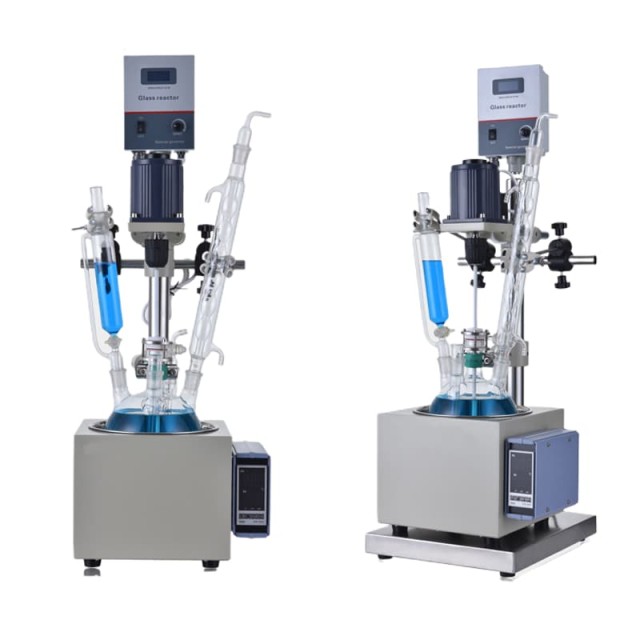
Glass Reactor
1-5L Single Jacketed Glass Reactor Vessel for Lab Use
Item Number : KR-1S
Price varies based on specs and customizations
- Reactor Volume
- 1-5 L
- Funnel size
- 0.2-0.5 L
- Stirring Speed
- 0-1300 rpm
- Working temperature
- -80~250 ℃
- Vacuum
- 0.098 Mpa

Shipping:
Contact us to get shipping details Enjoy On-time Dispatch Guarantee.
Applications
Glass reactor system combines the glassware vessel, speed controlled stirring, controlled temperature heating or chilling, as while as filtering, lifting, or tilting mechanical functions, which creates an idea environment for the different target materials synthetic reaction, distillation, separation and filtration in the pharmaceutical, chemical, biological products and other industries.
KinTek glass reactors vessel volumes are from 1 liters to 200 liters,glassware can be single, double and triple jacketed, stirring system can be fixed speed or various speed adjustable, agitating shaft and impeller can be different materials or assembling, reactor assemble can be lift-able and tilt-able for convenient materials handling, standard input and output ports for heating or chilling circulating, also supply various optional functions like filtering assembling, anti-explosive controls, warm keep jacket, heating jacket and so on. Kindle tech also offer reactor custom tailor service, client just text us the working purpose and requests, we will work out detail plan proposals to our clients.
Features
 |
|
Technical specifications

| Model | KGR-1 | KGR-2 | KGR-3 | KGR-5 |
| Reactor Volume | 1L | 2L | 3L | 5L |
| Funnel size | 0.2L | 0.2L | 0.2L | 0.5L |
| Vacuum Sealing | Telflon+Viton Sealing | |||
| Speed Control | Knop Stepless Speed Regulation | |||
| Stirring Speed | 0-1300rpm | |||
| Working temperature | -80~250℃ | |||
| Vacuum | 0.098Mpa | |||
| Safty Protection | Over-current/ ground fault/over-temperature protection | |||
| Working Environment | 5-35℃ | |||
| Power Supply | 110-440V, 50/60Hz | |||
| Overall Dimensions | 480*420*1110 mm | 480*420*1110 mm | 480*420*1110 mm | 591*520*1594mm |
| Net weight | 19kg | 20kg | 21kg | 34kg |
Warnings
Operator safety is the top important issue! Please operate the equipment with cautions. Working with inflammable& explosive or toxic gases is very dangerous, operators must take all necessary precautions before starting the equipment. Working with positive pressure inside the reactors or chambers is dangerous, operator must fellow the safety procedures strictly. Extra caution must also be taken when operating with air-reactive materials, especially under vacuum. A leak can draw air into the apparatus and cause a violent reaction to occur.
Designed for You
KinTek provide deep custom made service and equipment to worldwide customers, our specialized teamwork and rich experienced engineers are capable to undertake the custom tailoring hardware and software equipment requirements, and help our customer to build up the exclusive and personalized equipment and solution!
Would you please drop your ideas to us, our engineers are ready for you now!
FAQ
What Is A Glass Reactor?
What Are The Advantages Of Glass Reactor?
What Material Is Glass Reactor?
What Are The Different Types Of Glass Reactors?
What Temperature Should A Glass Reactor Be?
4.7
out of
5
The KINTEK SOLUTION 5L glass reactor is a great choice for lab use. It's well-made and easy to use.
4.8
out of
5
I'm really impressed with the quality of this product. It's made of high-quality materials and is very durable.
4.9
out of
5
This glass reactor is a great value for the price. It's feature-rich and easy to operate.
4.6
out of
5
The delivery of this product was very fast and the packaging was excellent.
4.7
out of
5
The customer service of KINTEK SOLUTION is excellent. They are always willing to help and answer any questions.
4.8
out of
5
I highly recommend this product to anyone looking for a high-quality glass reactor.
4.9
out of
5
The 5L glass reactor from KINTEK SOLUTION is a great addition to our lab. It's easy to use and has a wide range of features.
4.6
out of
5
I'm very happy with this purchase. The glass reactor is exactly as described and works perfectly.
4.7
out of
5
The KINTEK SOLUTION 5L glass reactor is a great choice for small-scale reactions. It's easy to clean and maintain.
4.8
out of
5
I'm very impressed with the quality of this product. It's made of high-quality materials and is very durable.
4.9
out of
5
This glass reactor is a great value for the price. It's feature-rich and easy to operate.
4.6
out of
5
The delivery of this product was very fast and the packaging was excellent.
4.7
out of
5
The customer service of KINTEK SOLUTION is excellent. They are always willing to help and answer any questions.
4.8
out of
5
I highly recommend this product to anyone looking for a high-quality glass reactor.
4.9
out of
5
The 5L glass reactor from KINTEK SOLUTION is a great addition to our lab. It's easy to use and has a wide range of features.
4.6
out of
5
I'm very happy with this purchase. The glass reactor is exactly as described and works perfectly.
4.7
out of
5
The KINTEK SOLUTION 5L glass reactor is a great choice for small-scale reactions. It's easy to clean and maintain.
REQUEST A QUOTE
Our professional team will reply to you within one business day. Please feel free to contact us!
Related Products

1-5L Jacketed Glass Reactor Vessel Lab Glass Reactor
Discover the perfect solution for your pharmaceutical, chemical, or biological products with our 1-5L jacket glass reactor system. Custom options available.
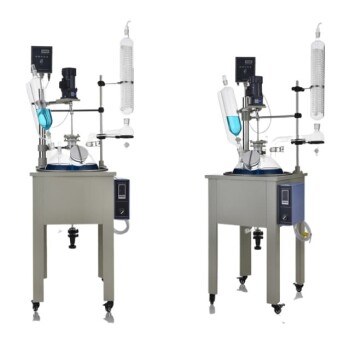
10-50L Single Jacketed Glass Reactor Vessel for Lab Applications
Looking for a reliable single glass reactor system for your lab? Our 10-50L reactor offers precise temperature and stirring control, durable support, and safety features for synthetic reactions, distillation, and more. KinTek's customizable options and tailored services are here to meet your needs.
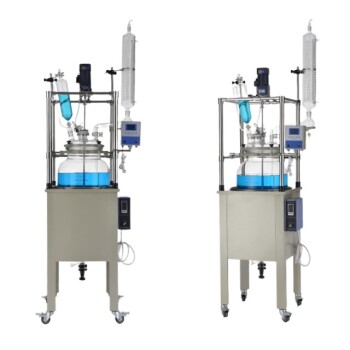
80-150L Single Jacketed Glass Reactor Vessel for Lab Use
Looking for a glass reactor system for your lab? Our 80-150L single glass reactor offers controlled temperature, speed, and mechanical functions for synthetic reactions, distillation, and more. With customizable options and tailored services, KinTek has you covered.

Lifting Tilting Jacketed Glass Reactor Vessel for Lab Use
Enhance your synthetic reactions, distillation, and filtration processes with our lifting/tilting glass reactor system. With a wide range of temperature adaptability, accurate stirring control, and solvent-resistant valves, our system guarantees stable and pure results. Explore the features and optional functions today!
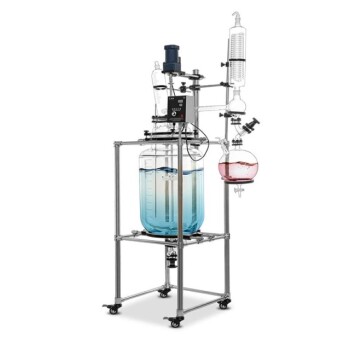
10-50L Jacketed Glass Reactor Vessel for Lab Applications
Discover the Versatile 10-50L Jacket Glass Reactor for Pharmaceutical, Chemical, and Biological Industries. Accurate Stirring Speed Control, Multiple Safety Protections, and Customizable Options Available. KinTek, Your Glass Reactor Partner.
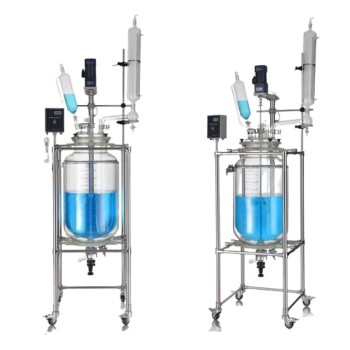
80-150L Jacketed Glass Reactor Vessel for Lab Applications
Looking for a versatile jacket glass reactor system for your lab? Our 80-150L reactor offers controlled temperature, speed, and mechanical functions for synthetic reactions, distillation, and more. With customizable options and tailored services, KinTek has you covered.

1700℃ Controlled Atmosphere Furnace Nitrogen Inert Atmosphere Furnace
KT-17A Controlled atmosphere furnace: 1700℃ heating, vacuum sealing technology, PID temperature control, and versatile TFT smart touch screen controller for laboratory and industrial use.
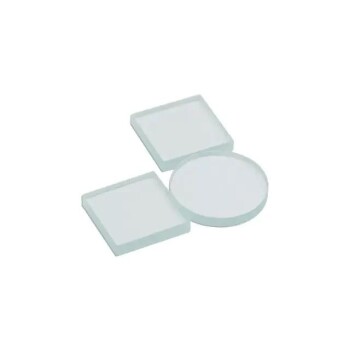
Float Soda-Lime Optical Glass for Laboratory Use
Soda-lime glass, widely favored as an insulating substrate for thin/thick film deposition, is created by floating molten glass on molten tin. This method ensures uniform thickness and exceptionally flat surfaces.
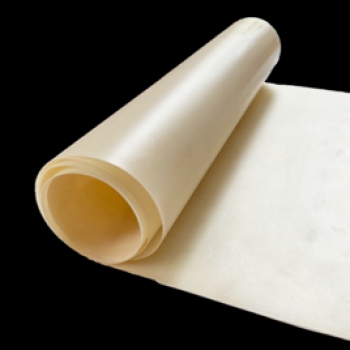
Anion Exchange Membrane for Laboratory Use
Anion exchange membranes (AEMs) are semipermeable membranes, usually made of ionomers, designed to conduct anions but reject gases such as oxygen or hydrogen.
Related Articles

Enhancing Safety in Your Laboratory: A Comprehensive Guide to Pressure Reactor Safety
Laboratory safety isn't just about you. Improper preparation and mishandling can cause potential hazards that could be disastrous if left unchecked. It is crucial to take the time to carefully prepare your pressure reactor and lab safety equipment, as even minor problems can escalate quickly when working under pressure.

How to Choose the Best Rotary Evaporator (Rotavapor) for Your Budget
A rotary evaporator, also known as a rotavapor, is a laboratory equipment used for distillation, evaporation, and separation of solvents.

Concentrate Your Samples with a Rotary Evaporator
Rotary evaporators are laboratory equipment used for the separation of solvents from samples. They are commonly used in chemistry, research, and pharmaceutical industries for the concentration of solutions and extraction of active compounds.

Expanding Possibilities with Rotavapor An Innovative Solution for Solvent Evaporation
Solvent evaporation is an essential process in many industries, including pharmaceuticals, food and beverage, and chemical manufacturing, among others.

Elevating Flavor and Aroma Molecular Gastronomy with Rotavapor
Rotovap, short for rotary evaporator, is a laboratory equipment used for separating solvents from samples through the process of evaporation.

A Step-by-Step Guide to Cleaning Laboratory Glassware
Maintaining clean and sterile glassware is crucial in any laboratory setting. Not only is it important for the accuracy and reliability of experiments, it is also essential for the safety of those working in the lab.

How To Clean Laboratory Glassware - Part 2
How To Clean Laboratory Glassware? Here are some considerations and tips.

How To Clean Laboratory Glassware - Part 1
Cleaning laboratory glassware isn't as simple as washing the dishes. Here's how to wash your glassware so that you won't ruin your chemical solution or laboratory experiment.

How to Get the Best Deal on a Rotavapor for Your Lab
A Rotavapor is an essential laboratory equipment that is widely used in various fields such as chemistry, biology, and pharmaceuticals.

Glassware vs. Plasticware - Which is the Better Choice for Your Needs?
Both glassware and plasticware have their own advantages and disadvantages, and the choice between the two will depend on the specific needs of your laboratory.

10 Essential Safety Steps for Pressure Reactor Use in Laboratories
Safety is paramount when conducting chemical reactions under pressurized conditions. It is important to carefully prepare pressure reactors and laboratory safety equipment to prevent potential hazards that, if not controlled, can have catastrophic consequences. In order to ensure the safety of using a pressure reactor, it is important to understand the specifications of the reactor. Become familiar with the chemistry of the reactor material and make sure it is chemically resistant enough to withstand the substances used in the reaction.

Safety Equipment In A Lab - Eye Protection
Safety glasses or chemical goggles must be donned before entering any wet bench lab, including cell culture labs. This applies to lab visitors, GT maintenance and custodial workers as well as staff and students.